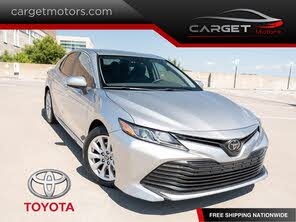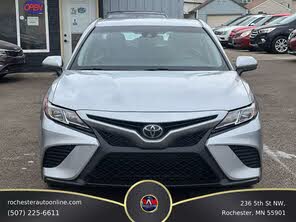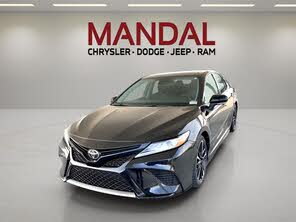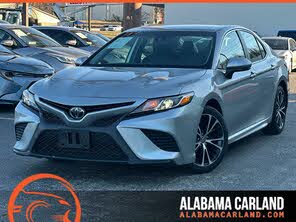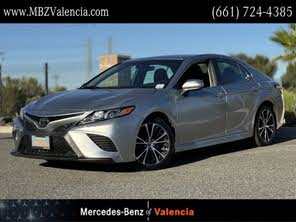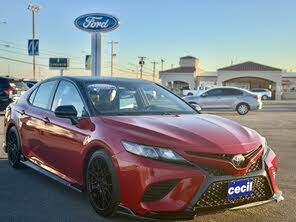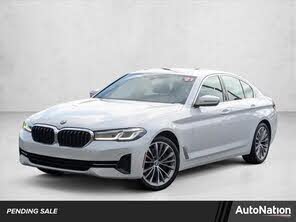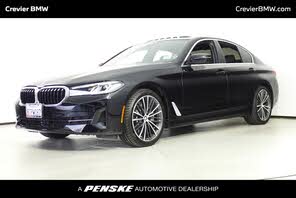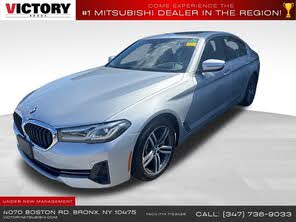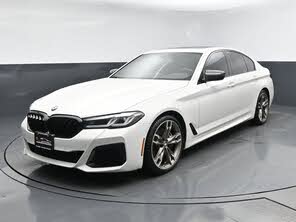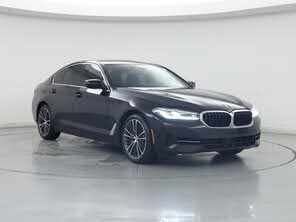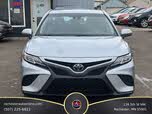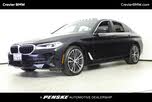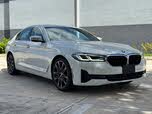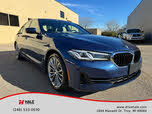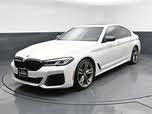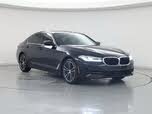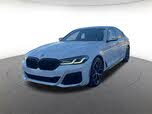2020 Toyota Camry vs 2021 BMW 5 Series
Overview | |
MSRP$24,425 | MSRP$54,200 |
Listings1388 | Listings295 |
Ratings & Reviews | |
User Reviews | User Reviews |
Expert reviews7.5 out of 10 | Expert reviews8.0 out of 10 |
Pros
Cons
| Pros
Cons
|
2020 Toyota Camry Reviews SummaryIf you can't beat them, join them. That seems to be Toyota's philosophy in updating the eighth generation of the Camry for the 2020 model year. This latest version of the perennial best seller debuted in 2017 as a 2018 model—and promptly lost its sales crown to Toyota's own RAV4 crossover SUV. As buyers continue to defect from cars, Toyota hopes to entice more shoppers to stick with its midsize sedan by offering all-wheel drive on the Camry for the first time since 1991. Also new for 2020 is the Camry TRD, a sportier version with a 301-horsepower V6 engine that makes its case to a buyer who might never have considered a Camry. | |
2021 BMW 5 Series Reviews SummaryBMW was once known for sports sedans, and the 5 Series was one of the most prolific of those sedans. Sitting between the 3 Series and 7 Series in size and price, previous generations of 5 Series were known for a balance of performance and luxury, with impeccable engineering throughout. Today, the BMW 5 Series is largely irrelevant. The 3 Series is now so big that there is less reason to upgrade, and most buyers are more interested in SUVs anyway. The competition—including the Audi A6, Jaguar XF, Mercedes-Benz E-Class, and Volvo S90—has also gotten better. That doesn’t mean BMW has given up on the 5 Series. The current generation (codename G30) arrived for the 2017 model year, but it gets a midcycle refresh (or LCI, short for “Life Cycle Impulse,” in BMW speak) for 2021. Major updates include a 48-volt mild-hybrid system, a bigger infotainment touchscreen, and subtle styling changes. The 2021 BMW 5 Series is not like the 5 Series models of old. That may drive away hardcore car fans, but the 2021 model makes a strong case to new-car buyers, maintaining sportier-than-average driving dynamics, along with the tech and luxury features expected of a car in this segment. | |
No video found | No video found |
Popular Features & Specs | |
Engine2.5L 203 hp I4 | Engine2.0L 248 hp I4 |
Drive TrainFWD | Drive TrainRWD |
Seating Capacity5 | Seating Capacity5 |
Horsepower | Horsepower248 hp @ 5200 rpm |
MPG City29 | MPG City25 |
MPG Highway41 | MPG Highway33 |
Engine | |
Engine Name2.5L 203 hp I4 | Engine Name2.0L 248 hp I4 |
Torque | Torque257 lb-ft @ 1500 rpm |
Horsepower | Horsepower248 hp @ 5200 rpm |
DrivetrainFWD | DrivetrainRWD |
Fuel Economy | |
MPG City29 | MPG City25 |
MPG Highway41 | MPG Highway33 |
Interior | |
Seating Capacity5 | Seating Capacity5 |
Key Features | |
Navigation System | Navigation SystemStandard |
Sunroof/Moonroof | Sunroof/MoonroofStandard |
Safety | |
Front Crash Overall5 | Front Crash Overall |
Side Crash Overall5 | Side Crash Overall |
Dimensions & Capacity | |
Cargo Space14.1 cu ft | Cargo Space14.0 cu ft |
Curb Weight3241 lbs | Curb Weight3765 lbs |
Height56.9 in | Height58.2 in |
Length192.1 in | Length195.8 in |
Width72.4 in | Width83.7 in |
Wheelbase111.2 in | Wheelbase117.1 in |
Maximum Payload925 lbs | Maximum Payload800 lbs |
Number of doors4 | Number of doors4 |
Overview | ||
MSRP | $24,425 | $54,200 |
Listings | ||
Ratings & Reviews | ||
User reviews | ||
Expert reviews | 7.5 out of 10Read full review | 8.0 out of 10Read full review |
Pros & cons | Pros
Cons
| Pros
Cons
|
Summary | If you can't beat them, join them. That seems to be Toyota's philosophy in updating the eighth generation of the Camry for the 2020 model year. This latest version of the perennial best seller debuted in 2017 as a 2018 model—and promptly lost its sales crown to Toyota's own RAV4 crossover SUV. As buyers continue to defect from cars, Toyota hopes to entice more shoppers to stick with its midsize sedan by offering all-wheel drive on the Camry for the first time since 1991. Also new for 2020 is the Camry TRD, a sportier version with a 301-horsepower V6 engine that makes its case to a buyer who might never have considered a Camry. | BMW was once known for sports sedans, and the 5 Series was one of the most prolific of those sedans. Sitting between the 3 Series and 7 Series in size and price, previous generations of 5 Series were known for a balance of performance and luxury, with impeccable engineering throughout. Today, the BMW 5 Series is largely irrelevant. The 3 Series is now so big that there is less reason to upgrade, and most buyers are more interested in SUVs anyway. The competition—including the Audi A6, Jaguar XF, Mercedes-Benz E-Class, and Volvo S90—has also gotten better. That doesn’t mean BMW has given up on the 5 Series. The current generation (codename G30) arrived for the 2017 model year, but it gets a midcycle refresh (or LCI, short for “Life Cycle Impulse,” in BMW speak) for 2021. Major updates include a 48-volt mild-hybrid system, a bigger infotainment touchscreen, and subtle styling changes. The 2021 BMW 5 Series is not like the 5 Series models of old. That may drive away hardcore car fans, but the 2021 model makes a strong case to new-car buyers, maintaining sportier-than-average driving dynamics, along with the tech and luxury features expected of a car in this segment. |
Video | No video found | No video found |
Popular Features & Specs | ||
Engine | 2.5L 203 hp I4 | 2.0L 248 hp I4 |
Drive Train | FWD | RWD |
Seating Capacity | 5 | 5 |
Horsepower | 248 hp @ 5200 rpm | |
MPG City | 29 | 25 |
MPG Highway | 41 | 33 |
Engine | ||
Engine Name | 2.5L 203 hp I4 | 2.0L 248 hp I4 |
Torque | 257 lb-ft @ 1500 rpm | |
Horsepower | 248 hp @ 5200 rpm | |
Drivetrain | FWD | RWD |
Fuel Economy | ||
MPG City | 29 | 25 |
MPG Highway | 41 | 33 |
Interior | ||
Seating Capacity | 5 | 5 |
Key Features | ||
Navigation System | Standard | |
Sunroof/Moonroof | Standard | |
Safety | ||
Front Crash Overall | 5 | |
Side Crash Overall | 5 | |
Dimensions & Capacity | ||
Cargo Space | 14.1 cu ft | 14.0 cu ft |
Curb Weight | 3241 lbs | 3765 lbs |
Height | 56.9 in | 58.2 in |
Length | 192.1 in | 195.8 in |
Width | 72.4 in | 83.7 in |
Wheelbase | 111.2 in | 117.1 in |
Maximum Payload | 925 lbs | 800 lbs |
Number of doors | 4 | 4 |
The 2020 Toyota Camry had a renewed focus on quality and appeal, aiming to reclaim its reputation for reliability and value. Its styling was more expressive than ever, with a bold front fascia and taut lines reminiscent of BMW's design cues. Inside, the Camry featured uniformly nice materials and a driver-focused dashboard, making even the base trims feel upscale. The TRD model added sporty red trim accents, elevating the driver's seat to a "cockpit" status. Despite these improvements, the Camry remained a mainstream sedan with a starting price of $25,380, not quite reaching the luxury or sport sedan status of a Lexus or BMW.
The 2021 BMW 5 Series had a restrained design, avoiding the flashy elements of other luxury sedans. For 2021, it received a minor styling refresh, including streamlined LED headlights and a larger twin-kidney grille. The interior retained the familiar BMW layout, with high-quality materials and a specific BMW style evident in the positioning of the touchscreen and the unique shifter. The 540i xDrive test car featured Nappa leather and aluminum trim, enhancing the high-end feel, although the sport steering wheel felt out of place. Overall, the 5 Series balanced luxury and sportiness, but leaned more towards a luxury car with sporty pretensions.

















The 2020 Toyota Camry offered four distinct powertrains: a 2.5-liter four-cylinder with FWD or AWD, a 3.5-liter V6 with FWD, and a hybrid powertrain. The 3.5-liter V6 produced 301 horsepower and was paired with an eight-speed automatic transmission, providing a smooth and powerful driving experience. The 2.5-liter four-cylinder, with 203 hp (206 in XSE trim), was lighter and offered a more engaging drive, especially in the sporty XSE trim. The AWD system, similar to that in the RAV4, could send up to half of the engine's 184 lb-ft of torque to the rear wheels, improving traction in slippery conditions. Fuel economy varied, with the FWD four-cylinder achieving 31 mpg combined, the AWD version 28 mpg, and the V6 models around 25-26 mpg.
The 2021 BMW 5 Series offered a range of powertrains, starting with the 530i's 2.0-liter turbocharged four-cylinder engine, producing 248 hp and 258 lb-ft of torque, capable of 0-60 mph in 5.9 seconds. The 540i featured a 3.0-liter turbocharged inline-six with a 48-volt mild hybrid system, generating 335 hp and 362 lb-ft of torque, achieving 0-60 mph in 4.9 seconds (4.6 seconds with xDrive). The M550i xDrive boasted a 4.4-liter twin-turbo V8 with 532 hp, while the M5's V8 produced 617 hp, reaching 0-60 mph in just 3.1 seconds. The 530e plug-in hybrid combined a 2.0-liter engine with an electric motor, offering 288 hp and a 0-60 mph time of 5.7 seconds, with an electric-only driving capability.
The 2020 Toyota Camry was user-friendly, with controls that were easy to reach and operate. The front seats offered increased legroom and hip room compared to the previous generation, but the rear seat had reduced legroom and overall passenger volume. The trunk space was 15.1 cubic feet, smaller than some competitors. The addition of AWD did not compromise the trunk or passenger space, thanks to modifications in the floor structure and fuel tank.
The 2021 BMW 5 Series, available only as a sedan in the U.S., offered spacious front seats and adequate rear-seat room. The trunk space was 14.0 cubic feet, more than the Audi A6 or Mercedes-Benz E-Class, with a 40/20/20 split-folding rear bench for longer items. The test car featured 16-way power front seats with various adjustments, heating, and ventilation. Forward visibility was limited due to the long, high hood, but a surround-view camera system helped with parking.
The 2020 Toyota Camry added Android Auto compatibility to its standard features, joining Apple CarPlay, Amazon Alexa, and SiriusXM satellite radio. The standard infotainment system had a 7-inch touchscreen, with an optional 8-inch upgrade. The system was functional and responsive, with hard buttons for major functions. Higher trims offered a 7-inch multi-information display and an optional 10-inch head-up display. A three-month trial of WiFi Connect and a one-year trial of Remote Connect were also included.
The 2021 BMW 5 Series featured a standard 12.3-inch infotainment touchscreen with the latest iDrive 7 system and a 12.3-inch Live Cockpit Professional digital instrument cluster. Standard features included Apple CarPlay/Android Auto compatibility, Bluetooth, SiriusXM 360L satellite radio, and a built-in WiFi hotspot. The infotainment screen's graphics were excellent, and the rotary knob controller provided a tactile interface. Voice control and gesture controls were also available, although the latter required learning specific gestures.
The 2020 Toyota Camry came with Toyota's Safety Sense suite, including a pre-collision system with emergency braking, dynamic radar adaptive cruise control, lane-departure warning with steering assist, and automatic high beams. A one-year trial of Safety Connect was included, and blind-spot monitoring with rear cross-traffic alert was optional. The Camry earned a five-star rating from the NHTSA and a Top Safety Pick+ from the IIHS. There was one NHTSA recall for leaking engine coolant, affecting up to 44,191 cars with 2.5-liter engines.
The 2021 BMW 5 Series had not been crash-tested by the IIHS, but the 2020 model received a Top Safety Pick+ award. Standard safety features included lane-departure warning, automatic emergency braking, blind-spot monitoring with rear cross-traffic alert, and automatic high beams. The Driving Assistance Plus Package added adaptive cruise control, traffic-jam assist, lane-keep assist, and emergency stop assist. BMW's driver-assist tech was noted for its sophistication and smooth operation.
CarGurus highlights

According to CarGurus experts, the overall rating for the 2020 Toyota Camry is 7.5 out of 10, while the 2021 BMW 5 Series scores 8.0 out of 10. Based on these ratings, the 2021 BMW 5 Series is the recommended choice for those seeking a higher level of luxury, performance, and advanced technology.
Choose the 2020 Toyota Camry if:
- You prioritize reliability and value in a mainstream sedan.
- You want a car with a user-friendly infotainment system and standard smartphone integration.
- You need a vehicle with a strong safety record and comprehensive safety features.
Choose the 2021 BMW 5 Series if:
- You seek a luxury sedan with a refined and spacious interior.
- You desire a range of powerful and efficient powertrain options, including a plug-in hybrid.
- You value advanced technology and sophisticated driver-assist features.
CarGurus highlights

According to CarGurus experts, the overall rating for the 2020 Toyota Camry is 7.5 out of 10, while the 2021 BMW 5 Series scores 8.0 out of 10. Based on these ratings, the 2021 BMW 5 Series is the recommended choice for those seeking a higher level of luxury, performance, and advanced technology.
Choose the 2020 Toyota Camry if:
Shop Now- You prioritize reliability and value in a mainstream sedan.
- You want a car with a user-friendly infotainment system and standard smartphone integration.
- You need a vehicle with a strong safety record and comprehensive safety features.
Choose the 2021 BMW 5 Series if:
Shop Now- You seek a luxury sedan with a refined and spacious interior.
- You desire a range of powerful and efficient powertrain options, including a plug-in hybrid.
- You value advanced technology and sophisticated driver-assist features.

By: CarGurus + AI
At CarGurus, our team of experienced automotive writers remain at the heart of our content operation, conducting hands-on car tests and writing insightful guides that are backed by years of industry experience. To complement this, we are harnessing AI to make our content offering more diverse and more helpful to shoppers than ever. To achieve this, our AI systems are based exclusively on CarGurus content, ratings and data, so that what we produce is both unique to CarGurus, and uniquely helpful to car shoppers.

